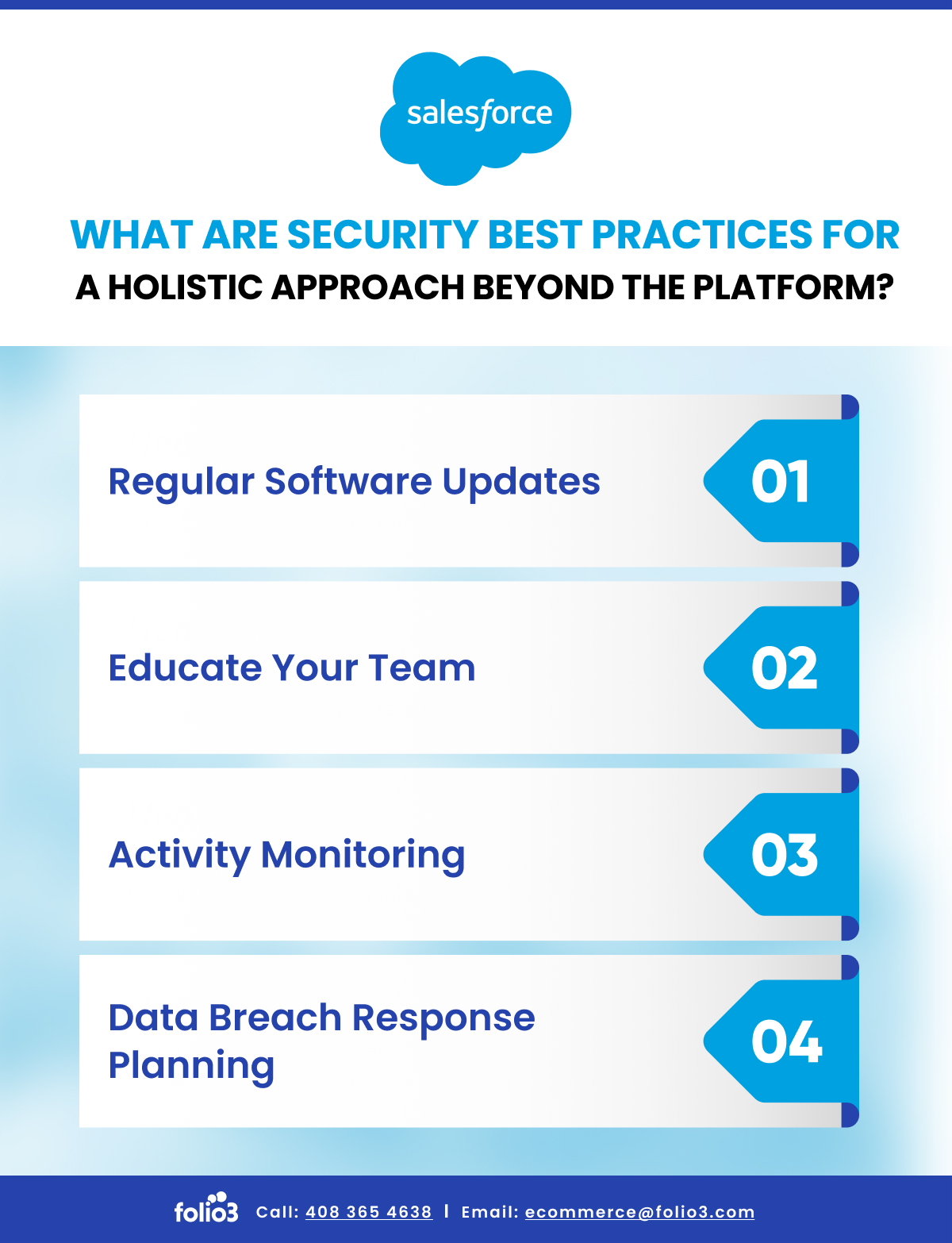Over 500,000 businesses trust Salesforce Commerce Cloud globally due to its commendable abilities. One of the most important aspects that contribute to this trust is its security features.
These features protect businesses from cyber attacks and ensure the security of customer data and transactions.
In this blog, let’s take a closer look at how Salesforce Commerce Cloud features contribute to the safety and security of businesses. We will also see how Salesforce Commerce Cloud implementation services can further strengthen your security measures.
We will begin with the security features of Salesforce Commerce Cloud.
Secure Infrastructure to Protect Your Data
Salesforce Commerce Cloud stands as a vigilant guardian of data. It provides a secure infrastructure for the protection of sensitive data such as customer information, purchase history, and payment details.
Additionally, Salesforce Commerce Cloud is compliant with industry-standard security certifications such as PCI DSS (Payment Card Industry Data Security Standard) and ISO 27001. The features of secure infrastructure include:
Data Encryption
As the gatekeeper of data integrity, Commerce Cloud employs advanced algorithms to secure information. Even the data that flows through the internet remains safe under the encryption protocols. Thus, this security factor falls under impactful Salesforce Commerce Cloud features.
Server Authentication
The trust in data exchange is built upon server authentication. Every handshake between servers confirms the legitimacy of the parties involved.
This happens when Salesforce 360 diligently authenticates each server involved in the data process. It establishes a trusted network that customers and businesses can rely on.
Regular Security Audits
The regular security audits reinforce the ramparts of this digital fortress. Even during Salesforce Commerce Cloud migration, these consistent evaluations act like sentinels, checking vulnerabilities or fortifications needed.
It’s where Commerce Cloud Salesforce commits to perpetual auditing and takes charge to protect against emerging cyber threats.
Compliance Certifications
Salesforce Cloud Commerce hoists the banners of legal compliance high, which serve as a testament to their commitment to secure operations. These standards are way more than just badges of honor.
Instead, the certificates promise the realm of ecommerce that every merchant and their customer is under the protective eye of Salesforce Commerce Cloud.
Read More: Salesforce Merchandising
Granular Access Control in the Right Hands
Access control is determining and regulating access to specific resources or information within a system. The major role of this essential aspect of security in any organization is divided into the following duties:
Define User Roles
The precise definition of user roles within an organization sets them apart from the rest of the Salesforce Commerce Cloud features. With this feature, admins craft specific roles according to the responsibilities and needs of each team member.
The way it ensures that each employee has access only to the tools and data necessary for their job is the need of the hour in this digital age. After all, the risk of accidental or intentional data breaches is high.
Set Permission Levels
Alongside role definition, setting permission levels is necessary to maintain a secure business environment. There are several levels of permission required. For example, it can be view-only access or full edit and manage capabilities.
This granularity means a clear distribution of access rights, closely aligning with employees’ job functions and reducing the mismanagement of sensitive information. It also makes access control one of the most significant Salesforce Commerce Cloud features.
Read More: Salesforce Einstein GPT
Multi-factor Authentication (MFA)
Multifactor authentication (MFA) acts as a formidable barrier against unauthorized access. Remember, technology has made it easier to prove authentication via passwords.
That is why Salesforce commerce cloud development services ensure access is granted only after presenting multiple identity proofs, such as mobile verification codes, biometric scans, or security tokens. With this comprehensive approach to security, Salesforce Commerce Cloud prioritizes safeguarding sensitive information.
Role-Based Access Control (RBAC)
RBAC in Salesforce Commerce Cloud is a structural approach towards the Hierarchy of Security. By implementing granular access control through RBAC, you can access information and functions based on an individual’s role within an organization.
As you ascend this hierarchy, the level of access and control increases. It makes sure that sensitive areas of the platform are only accessible to users with appropriate responsibilities and required levels of trust.
Salesforce Shield for Demanding Needs
Salesforce Shield supercharges your security, building a robust barrier against threats while maintaining performance and usability. It’s like an invisible, unbreakable armor tailored for the demanding needs of modern commerce.
Field-Level Encryption
When it comes to encoding sensitive data, such as customer information and payment details, directly within the field, Salesforce Commerce Cloud is the master.
It is a need of almost every organization willing to thrive. In contrast to broader methods, it gives businesses the control to encrypt specific pieces of data. It ultimately minimizes the risk of exposure in the unlikely event of a breach.
Data Event Monitoring
If you want your setup to stay ahead of potential security threats, this is one of the useful Salesforce Commerce Cloud features with Salesforce’s Data Event Monitoring. Tracking every access and action on your system gives you real-time visibility.
This transparency assists in spotting unusual activity quickly and taking action. It’s like having a surveillance camera on your data, monitoring every interaction, whether big or small.
Platform Encryption
Salesforce Shield also brings platform encryption to the table. With this, your data isn’t just protected at rest but throughout its lifecycle. Encryption also applies to your data in transit, keeping it safe from the point of entry to its destined use.
In short, it remains secure regardless of how your data moves or where it resides within the Commerce Cloud.
Read More: Salesforce vs. Microsoft Dynamics
What Are Security Best Practices for a Holistic Approach Beyond the Platform?
Regular Software Updates
The success of Salesforce Commerce Cloud features depends on frequent updates. Each update often performs dual tasks. For instance, it patches vulnerabilities and enhances existing security features.
So, businesses must prioritize and apply these updates to protect their ecommerce platform against new threats.
Educate Your Team
We often neglect the human element or consider it the weakest link in security while providing Salesforce Commerce Cloud support. However, your team needs to invest in regular training sessions to mitigate this risk significantly.
So, educating staff on recognizing phishing attempts, managing passwords safely, and following security protocols is no less than a security measure. After all, well-aware team members can act as the first line of defense against cyber threats.
Activity Monitoring
Keeping a strong eye on your system’s activity is crucial at many levels. Another best practice involves setting up alerts for unusual behavior that could indicate a security breach.
By closely monitoring login patterns, user actions, and other system operations, you can quickly detect and respond to potential security issues before they escalate.
Data Breach Response Planning
Even with all precautions, breaches can occur. Nothing can guarantee 100% sustainable security. That’s why having a well-structured response plan is imperative.
This plan should outline the steps immediately after detecting a breach, including isolating affected systems, informing stakeholders, and executing remediation strategies to prevent further damage.
Building Trust, One Secure Step at a Time
Businesses must adopt the strategy of attaining one secure step at a time. Or else they will lack maintaining one protective measure or the other.
By benefiting from Salesforce Commerce Cloud features like advanced encryption and regular security audits, you can demonstrate your commitment to privacy and security.
Folio3 can help you with that. You can get in touch with our Salesforce Commerce Cloud developers to create a foundation of trust that supports all aspects of your customer relationships.
Conclusion
In summary, the reason behind the Commerce Cloud’s popularity is Salesforce Commerce Cloud features that ensure security and safety for your business and customers. However, to make that possible, you need help from Salesforce Commerce Cloud Consultants.
With the best expertise and support, you can secure your ecommerce platform against threats and build trust with your customers. All you have to do is take a step toward a secure future for your business by implementing Salesforce Commerce Cloud today.
FAQs
Which of These Security Features Is Built Into Salesforce?
Salesforce Commerce Cloud features include comprehensive security features such as robust user authentication, record-level security, field-level security, and platform encryption.
What Is the Security Functionality of Salesforce?
Salesforce provides strong privacy features such as user authentication, profile-based authorization, and field-level security to protect data and maintain privacy.
What Are the 4 Levels of Security in Salesforce?
The four levels of security in Salesforce are Object-Level, Field-Level, Record-Level, and Organization-Wide security settings.

Hasan Mustafa
Engineering Manager Salesforce at Folio3
Hasan Mustafa delivers tailored Salesforce solutions to meet clients' specific requirements, overseeing the implementation of scenarios aligned with their needs. He leads a team of Salesforce Administrators and Developers, manages pre-sales activities, and spearheads an internal academy focused on educating and mentoring newcomers in understanding the Salesforce ecosystem and guiding them on their professional journey.
